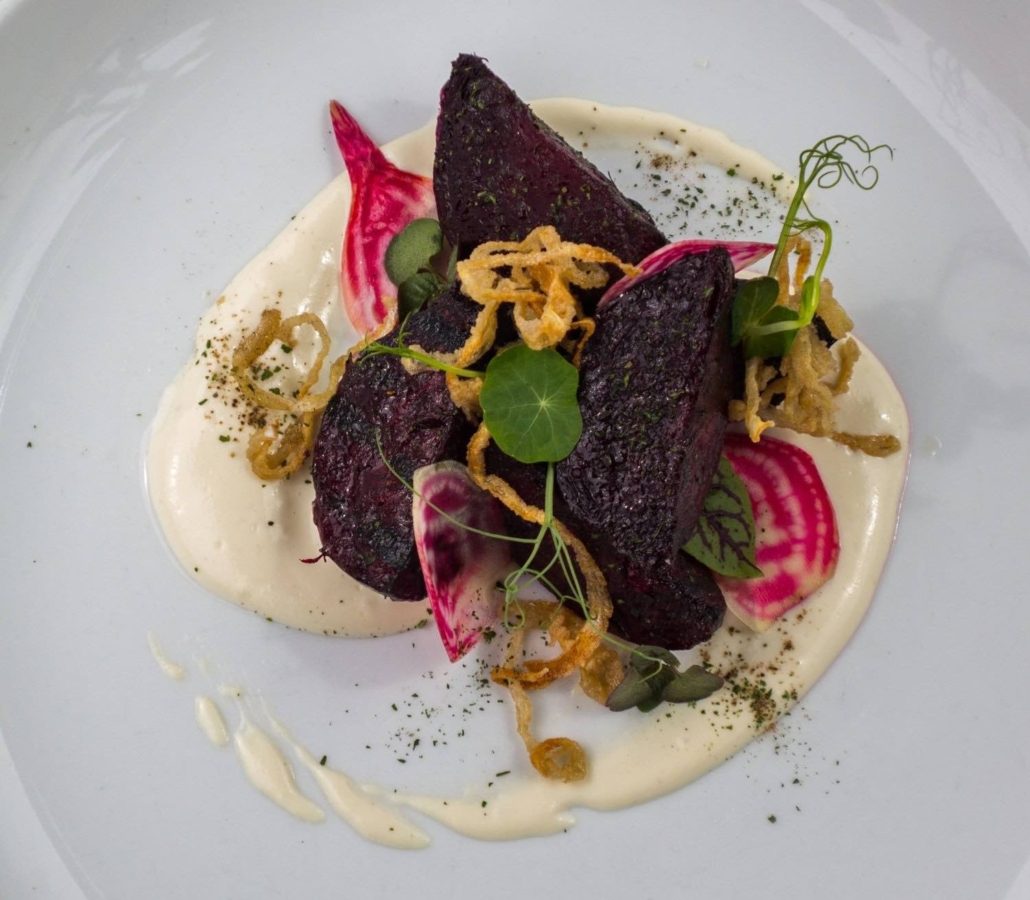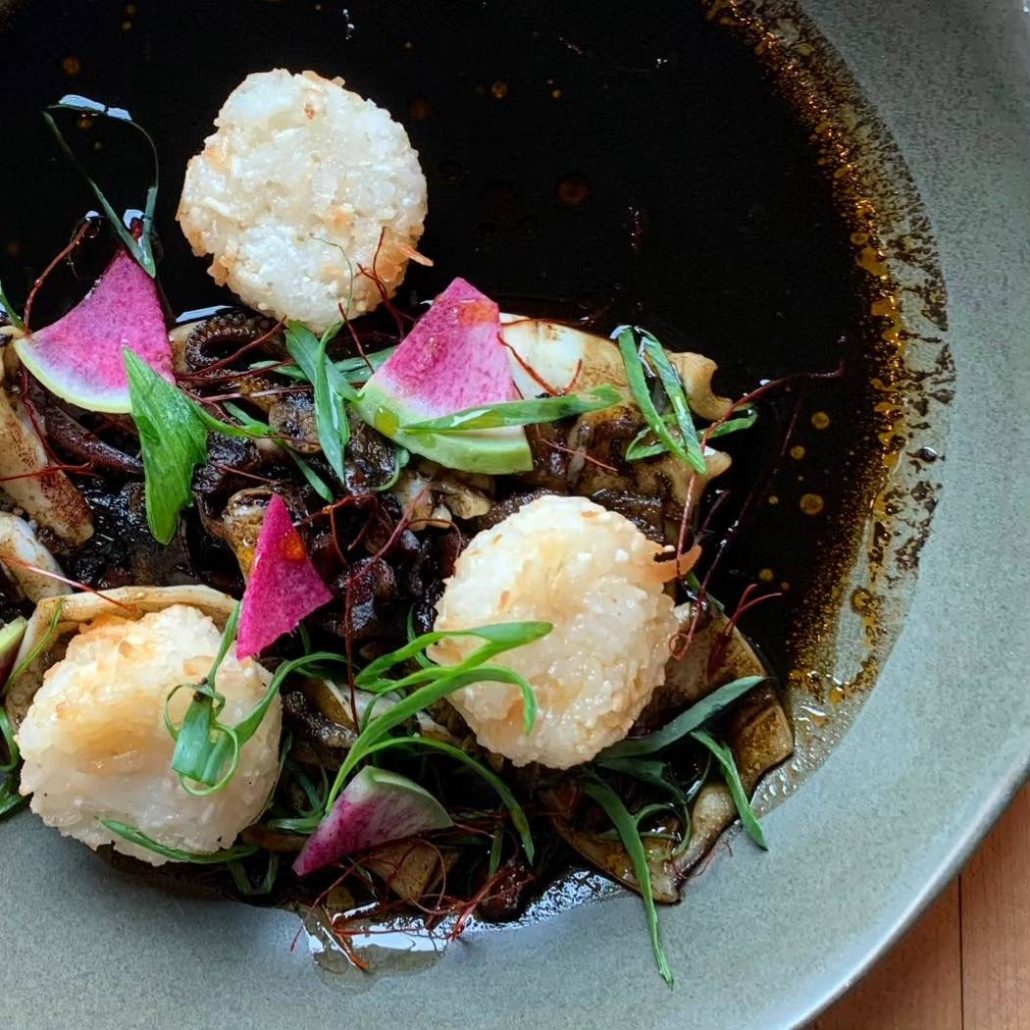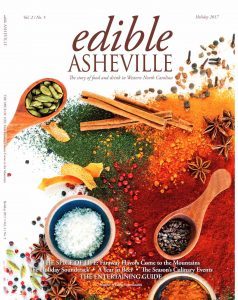Expect the Unexpected
Three Asheville chefs ask diners to forego the familiar for a culinary adventure
BY KAY WEST
***
For chain restaurants, the key to success is consistency and familiarity. The big restaurant conglomerates avoid throwing any surprises at their guests and each location offers pretty much the same experience as all of the others. The menu at Applebee’s Grill & Bar in Austin, for example, will be the same as the one in Asheville.
Independent restaurants and adventurous chefs, on the other hand, bank on surprise, on their own creativity and on diners’ curiosity and willingness to try something new. Menus change frequently, often with turns in the season and availability of local ingredients, and chefs are constantly looking to push their own boundaries—and, by turn, those of their guests—while still staying true to the need for impeccable flavors and textures.
We spoke with three successful Asheville chefs who have made a name for themselves and charted a path of success by embracing bold ideas.
BANKING ON SURPRISE
When Chef Jason Sellers opened Plant restaurant in 2011, veganism was far from mainstream and “plant-based diet” was not yet a branded term. After about six years cooking at Laughing Seed Café—a go-to Asheville spot for vegetarian fare—he was ready to open his own place. Luckily, he found partners and a prime location on Merrimon Avenue.
What he didn’t find were many people who believed in his concept. “I wanted to be the first person to open a full-service, refined, casual vegan restaurant,” he recalls. “People straight up told me it wouldn’t work. Vegetarian restaurants did fine, but veganism was too extreme.”
It would take seven years of success before Sellers put the word vegan front and center on Plant’s website. “I wasn’t worried anymore about driving people off, and by then, people were seeking vegan menus. There are few things that make me happier than the look of surprise on the faces of people who are dragged in against their will and find themselves fully enjoying a vegan meal.”
The spring menu at Plant lived up to expectations for the unexpected, featuring, for example, hostas—as in, the green plants (and asparagus relative) found in many shade gardens.
“Hostas are the most fun thing to blow people’s minds with,” Sellers says with obvious delight. “I love hosta season because people come in and say, ‘You have what?’ And then they order them out of curiosity and the transformation that occurs as they find they are loving a garden plant is so fun. They’ll never look at a hosta the same way again.”
Sellers uses about six to eight inches of the pale green shoots when they first come up and before they unfurl. “This spring we cooked them very quickly in a wok with some garlic, ginger and sesame, added a little smoked tamari and finished it with a bit of toasted sesame oil and, oh man, it’s so delicious.”

A dish of roasted beets at Plant.
BUILDING TRUST
“Delicious” is how Ryan Kline, executive chef at Jargon in West Asheville, describes the item often found leading the restaurant’s snacks section: pig ears. “I have a technique for turning things that feel unapproachable into something kind of familiar. We frame our pig ears like wings,” he says. “You want to bridge that gap between weird and something people are willing to try.”
Located in West Asheville, Jargon has a loyal following among local residents but views itself as “destination dining” for tourists who are often based downtown. But visitors do often make the short trek because of what Kline describes as “trust.”
“If you want to cook in unpredictable ways and make things people aren’t used to, your customers need to trust you and respect your skill,” he says. “Then they’re open to trying anything, because they trust it will be good.”
They may, for example, say yes to pork trotter (pig feet) tots with the classic French sauce ravigote, pickled onions and mustard flowers; and some type of offal is almost always a given on the Jargon menu. Liver mousse is a small plate Kline loves to play with, sometimes using duck, and recently rabbit. “It’s definitely not a traditional version of livermousse. We use buckwheat [a seed, not a wheat] for the crust so it’s gluten free.”
Because the farms Kline sources from are not harvesting much produce in the spring, he relies more heavily on foraged and wild foods like stinging nettles and Japanese knotweed, as well as fruits the kitchen preserved to capture their fleeting presence for another turn on the plate.
“I really like to use Japanese knotweed, which is a wild plant and related to rhubarb,” Kline explains. “It tastes like rhubarb and has a tang to it. It’s super pink. We had a lot of knotweed juice, and my sous chef, Paul Taylor, made a sweet-and-sour sauce with it.”
Some ideas simmer on a back burner for a long time before emerging on a plate, like the braised pistachio plated with a Joyce Farms duck breast. “About 15 years ago I had a dish at McCrady’s [a Charleston restaurant chef Sean Brock put on the map] that had a pine nut risotto on it. They pressure-cooked pine nuts so they had the texture of cooked rice,” he remembers. “We pressure-cooked pistachios with ras el hanout [a Moroccan spice mix] and reduced duck stock until it had the creamy texture of cooked beans.”
Kline encourages his kitchen staff to pursue their creativity. “We don’t put crazy things together that don’t work, or do anything for shock value, but we strive to make food that is different. If you could cook it at home, why would you go out?”

A dish with squid at Jargon.
CREATING EXPERIENCE
When Asheville’s widely anticipated first Filipinx restaurant opened in July 2022, it was a smash hit from the start. Neng Jr.’s earned top spots on several national Best Restaurant lists and received a finalist nomination for the 2023 James Beard Best New Restaurant.
The vibrant personality and life story of trans chef Silver Iocovozzi and his husband, sommelier Cherry Iocovozzi, also drew people to the mystique of the tiny 17-seat dining room accessed through a back door on an alley in West Asheville.
People who snag a coveted dinner reservation for one of Neng Jr.’s four nights of service will not find a menu to preview on the website.
If they’d like a hint of what Iocovozzi is pulling from his Filipino/American Southern heritage, there’s evidence aplenty on the restaurant’s Instagram account. For example, oil pickled shrimp served on a black paste of pamapa itum—described as coconut ash paste with root spices, ginger, galangal, lemongrass and shrimp oil—marries Low Country and Filipino techniques.
An oval plate of shad roe—touted as a Southern delicacy—is a study of dark brown on reddish brown. “My fish purveyor tells me when they get something super seasonal and I almost always take it, then figure out what to do with it,” Iocovozzi says. “The extraction of shad roe was taught by Indigenous peo – ple to early colonizers and became a deeply Southern thing with grits. I did my version of that with black rice, bacon, lemon and parsley. It’s not visually appealing but people who tried it loved it.”
On any given night, there are a dozen or so opportunities for first timers to experience something entirely new, though regulars can count on four staples: the adobo oyster, seasonal fruit, lumpia and queso ice cream. The oyster sets the stage with a memorable first impression: two plump, briny, silky raw oysters in their shells in puddles of adobo mignonette, topped with bright yellow cured quail yolks, encircled with a rope of tiny sea grapes.
Because the dishes on the printed menu are unfamiliar to even the most sophisticated and well-traveled of diners, Chef Silver relies heavily on his staff to deeply understand and translate to guests. “We fully describe the menu before they have to ask,” he says. “People can be intimidated by what they don’t know, so we want to take that on right away and just invite them to relax and enjoy.”
In early spring, Silver embarked on an adventure that is sure to unfurl in multiple ways at Neng Jr.’s. With Cherry, he went to Copenhagen, where they dove into the experience of three-Michelin-starred Noma, often described as the world’s best restaurant. In addition to more than a dozen courses of Nordic cuisine, Silver staged for two days— in the kitchen and in the fermentation lab.
“It was absolutely insane,” he says. “Sometimes you have experiences that just turn you around. I want people to come to Neng Jr.’s and have an experience.”
Save
Save
Save
Save
Save
Save
Save
Save
Save
Save

Jason Sellers of Plant

Ryan Kline of Jargon

Silver Iocovozzi of Neng Jr.’s
THE WEEKLY REVEL
Sign up for your free handpicked guide to enjoying life around Asheville.
Available weekly from May to October.





